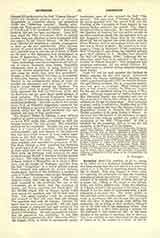

Accession (from Lat. accedere, to go to; hence, to be added to) is a method of acquiring ownership of a thing arising from the fact that it is in some way added to, or is the fruit of something already belonging to oneself. This may happen in three ways: (I) naturally; (2) artificially; (3) from the combined operation of nature and industry. (I) Natural.—The increase of an animal, the yield of fields, the rent of a house, etc., belong to the owner of the animal, fields, and house, respectively. Thus, the offspring of a female animal is the property of her owner, even though it be the result of intercourse with a male belonging to someone else. The axiom applies in the case that partus sequitur ventrem. The Louisiana Code, in accordance with the Roman law, provided that the issue of slaves though born during the temporary use or hiring of their mothers, belonged not to the hirer but to the permanent owner. But the offspring of a slave born during a tenancy for life belonged to the tenant for life. In the same division is the species of accession due to alluvion. This is an addition to one’s land made by the action of water, as by the current of a river. If this increase is gradual and imperceptible, the augmentation belongs to the owner of the land. If it has been sudden and in large quantity, by the common law it belongs to the State. (2) Artificial.—This sort occurs (a) by specification, when one’s labor or artistic talent is employed upon materials owned by another, so that anew substance or thing is produced. Where this is done in good faith, the product belongs to the artist or laborer with the obligation on his part of indemnifying the owner of the materials. (b) By adjunction, when one’s labor and material have been so united with the property of another that they cannot be separated. The resultant then belongs to him who has contributed the more important component. (c) By blending, when materials of equal value appertaining to different owners, are mixed together. The thing or its price is then to be divided according to natural equity between the original possessors, if the mixture has been made in good faith; otherwise the weight of law is thrown in his favor whose right has been violated. (3) Mixed.—An example of the third kind of accession is the building of a house on another’s ground, or the planting of trees or sowing of vegetables in another’s field. The house, trees, etc., belong to the master of the soil after making suitable compensation to the builder, planter, etc.
JOSEPH F. DELANY

